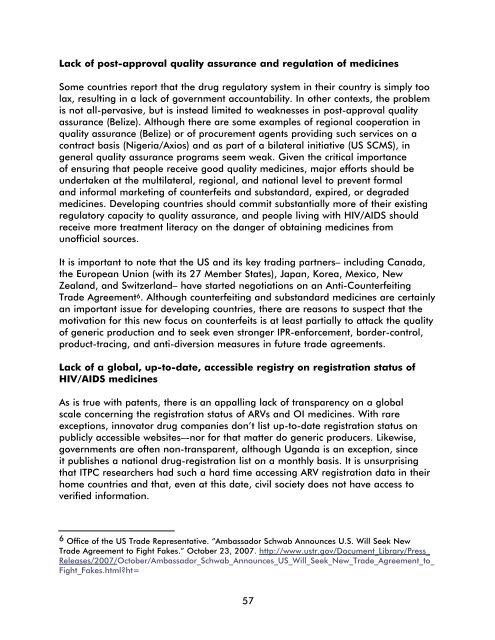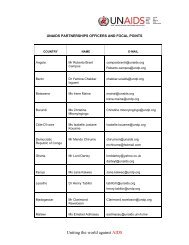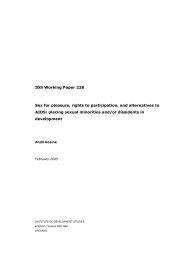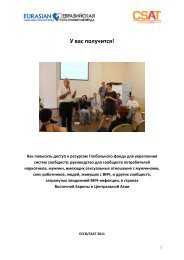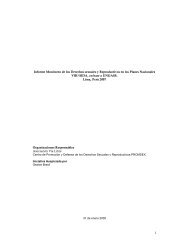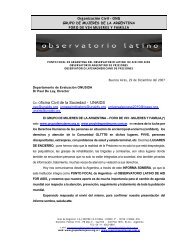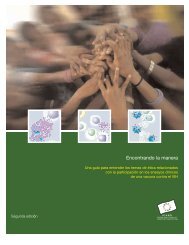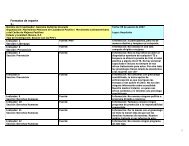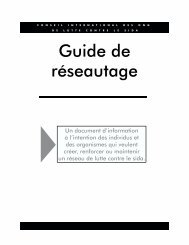Missing the Target #5: Improving AIDS Drug Access ... - CD8 T cells
Missing the Target #5: Improving AIDS Drug Access ... - CD8 T cells
Missing the Target #5: Improving AIDS Drug Access ... - CD8 T cells
You also want an ePaper? Increase the reach of your titles
YUMPU automatically turns print PDFs into web optimized ePapers that Google loves.
Lack of post-approval quality assurance and regulation of medicinesSome countries report that <strong>the</strong> drug regulatory system in <strong>the</strong>ir country is simply toolax, resulting in a lack of government accountability. In o<strong>the</strong>r contexts, <strong>the</strong> problemis not all-pervasive, but is instead limited to weaknesses in post-approval qualityassurance (Belize). Although <strong>the</strong>re are some examples of regional cooperation inquality assurance (Belize) or of procurement agents providing such services on acontract basis (Nigeria/Axios) and as part of a bilateral initiative (US SCMS), ingeneral quality assurance programs seem weak. Given <strong>the</strong> critical importanceof ensuring that people receive good quality medicines, major efforts should beundertaken at <strong>the</strong> multilateral, regional, and national level to prevent formaland informal marketing of counterfeits and substandard, expired, or degradedmedicines. Developing countries should commit substantially more of <strong>the</strong>ir existingregulatory capacity to quality assurance, and people living with HIV/<strong>AIDS</strong> shouldreceive more treatment literacy on <strong>the</strong> danger of obtaining medicines fromunofficial sources.It is important to note that <strong>the</strong> US and its key trading partners– including Canada,<strong>the</strong> European Union (with its 27 Member States), Japan, Korea, Mexico, NewZealand, and Switzerland– have started negotiations on an Anti-CounterfeitingTrade Agreement 6 . Although counterfeiting and substandard medicines are certainlyan important issue for developing countries, <strong>the</strong>re are reasons to suspect that <strong>the</strong>motivation for this new focus on counterfeits is at least partially to attack <strong>the</strong> qualityof generic production and to seek even stronger IPR-enforcement, border-control,product-tracing, and anti-diversion measures in future trade agreements.Lack of a global, up-to-date, accessible registry on registration status ofHIV/<strong>AIDS</strong> medicinesAs is true with patents, <strong>the</strong>re is an appalling lack of transparency on a globalscale concerning <strong>the</strong> registration status of ARVs and OI medicines. With rareexceptions, innovator drug companies don’t list up-to-date registration status onpublicly accessible websites–-nor for that matter do generic producers. Likewise,governments are often non-transparent, although Uganda is an exception, sinceit publishes a national drug-registration list on a monthly basis. It is unsurprisingthat ITPC researchers had such a hard time accessing ARV registration data in <strong>the</strong>irhome countries and that, even at this date, civil society does not have access toverified information.6 Office of <strong>the</strong> US Trade Representative. “Ambassador Schwab Announces U.S. Will Seek NewTrade Agreement to Fight Fakes.” October 23, 2007. http://www.ustr.gov/Document_Library/Press_Releases/2007/October/Ambassador_Schwab_Announces_US_Will_Seek_New_Trade_Agreement_to_Fight_Fakes.html?ht=57


